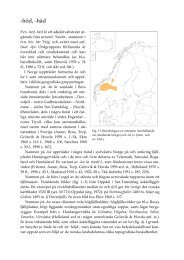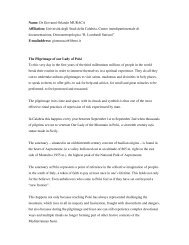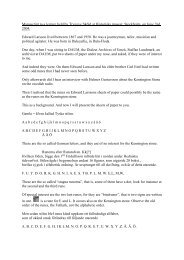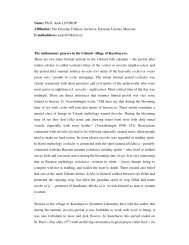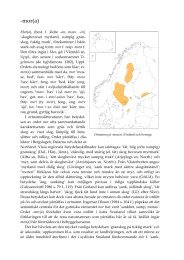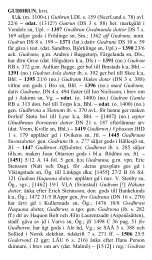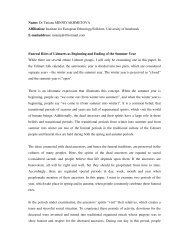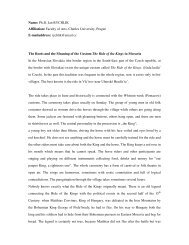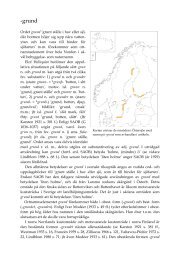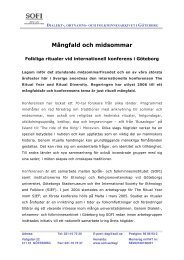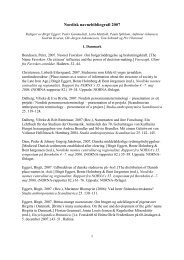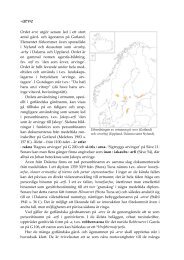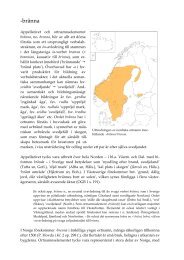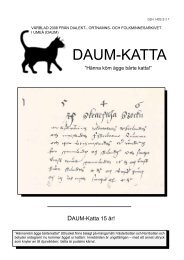NORNA-RAPPORTER 88 Binamn. Uppkomst, bildning, terminologi ...
NORNA-RAPPORTER 88 Binamn. Uppkomst, bildning, terminologi ...
NORNA-RAPPORTER 88 Binamn. Uppkomst, bildning, terminologi ...
You also want an ePaper? Increase the reach of your titles
YUMPU automatically turns print PDFs into web optimized ePapers that Google loves.
26 Bertie Neethling<br />
A socio-onomastic approach<br />
The focus in the current project is characterised by a socio-onomastic or socio-<br />
and psycholinguistic approach. The bestowed names at birth on an individual<br />
are also those ones the individual still carries into his/her grave. It is probably<br />
acceptable to postulate that given first names along with the accompanying<br />
family name, are one of the most stable elements in any identity profile. Many<br />
people also make (usually) valid assumptions about the perceived identity of<br />
an individual just by looking at or hearing a name. This, incidentally, was also<br />
tested in the questionnaire and many students agreed, giving examples. Assumptions<br />
are often made about nationality, race or ethnicity, language, gender,<br />
religious affiliation, etc. based on a name only. If that is true, it is not an<br />
exaggeration to say that an individual is often ‘categorised’ or ‘labelled’ purely<br />
on the basis of his/her name. Then it becomes clear that names can indeed function<br />
as strong indicators of identity.<br />
An individual, wherever s/he finds her/himself, cannot easily discard her/his<br />
name(s) and it remains fairly stable. Thus whenever an individual considers<br />
doing something unlawful, one often finds that an alias is adopted, thereby trying<br />
to hide the true identity. An interesting view on this aspect was found in a<br />
letter to the Afrikaans daily, Die Burger, in the Western Cape in South Africa.<br />
An Afrikaans speaking correspondent (W. L. van der Merwe), writing from<br />
Austria, had this to say (in Afrikaans) about one’s identity :<br />
…hulle (= filosowe) is dit eens dat jy nie jou identiteit kan verkoop of verruil nie.<br />
Dit is soos jou eie naam, wat jy nie self kon kies nie, maar wat jy tot in die hof<br />
sal verdedig as iemand dit skend. Jy kan later ander identiteite aanneem, maar jy<br />
kan nie jou eerste, oorspronklike identiteit ontken nie. As jy dit ontken, draai jy<br />
jou rug op ‘n persoonlike geskiedenis. Jy word ‘n banneling na binne. (Die Burger,<br />
6 May, 2005)<br />
[They (= philosophers) agree that you cannot sell or exchange your identity. It is<br />
like your own name that you could not choose yourself, but that you will defend<br />
in court should somebody dishonour it. You may assume other identities later,<br />
but you cannot negate your first, original identity. Should you do that, you turn<br />
your back upon a personal history. You become an exile inwardly.] (Translation:<br />
BN)<br />
In the UWC project respondents were asked whether they saw their name(s) as<br />
a reflection of their identity. From the responses it was clear that many, probably<br />
most have never been confronted with such a question before. In spite<br />
thereof, a significant number very strongly agreed. This was particularly true<br />
for the Xhosa speaking respondents and not surprisingly so: Xhosa first names<br />
are formed via the lexicon of the Xhosa language, and appropriate nouns and<br />
verbs are used in this regard. The outcome is that names are invariably<br />
meaningful, and knowledge of the language allows one to infer the meaning of<br />
the Xhosa names (see also Brennen 2000). Name giving is generally considered<br />
to be an important cultural event, and care is taken that names project<br />
positive values that are often strongly embedded in the Xhosa culture (see



